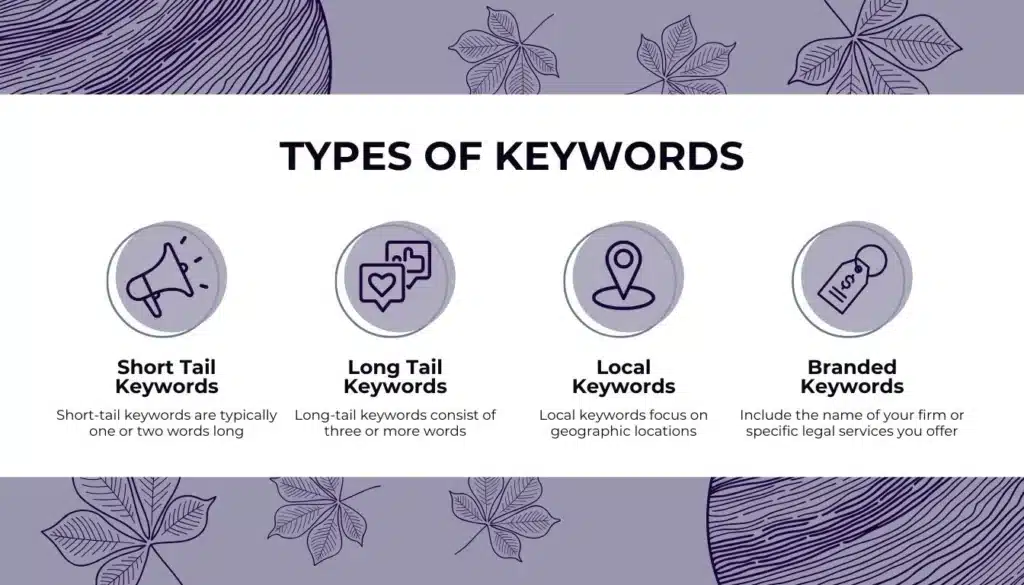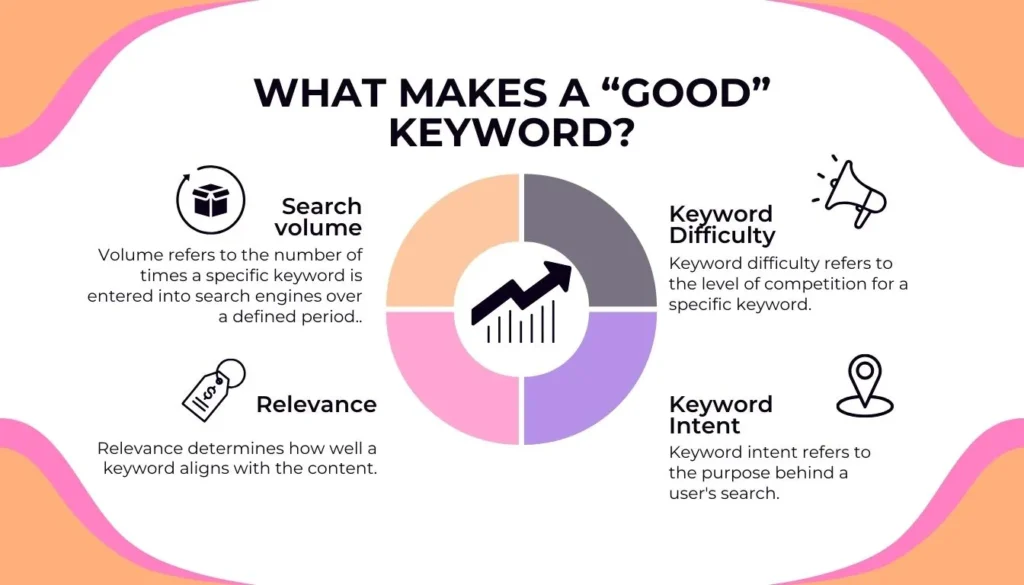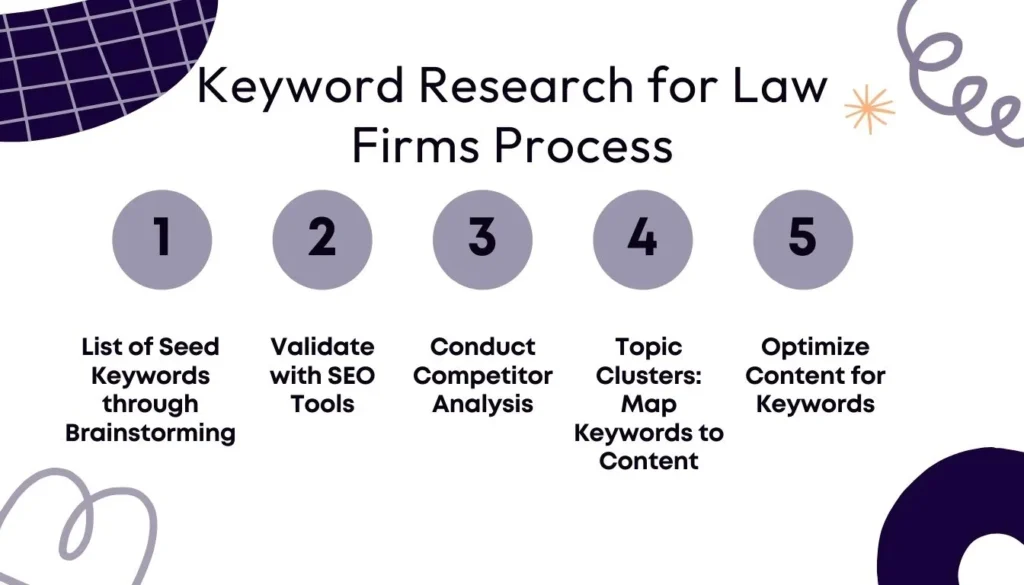In the ever-evolving digital landscape, law firms must navigate a complex web of online visibility to attract clients. As potential clients increasingly turn to search engines for legal advice, effective keyword research for law firms and lawyers/attorneys becomes essential in this competitive field.
Understanding how to optimize your firm’s website isn’t just a technical task; it’s an opportunity to connect with individuals seeking your expertise.
This law firm SEO guide will dig into the importance of keyword research for lawyers and attorneys, and explore strategies that can elevate your law firm’s SEO in 2024.
We’ll cover everything you need to know from identifying what makes a “good” keyword to utilizing powerful tools like Google Keyword Planner and Google Trends.
What Are Keywords?
Keywords are the building blocks of online search. They are specific words or phrases that user type into search engines when looking for information, services, or products.
For lawyers, selecting the right keywords is crucial. It helps potential clients find legal services relevant to their needs. Whether it’s “divorce attorney” or “personal injury lawyer,” each keyword tells a story about user intent.
Types of Keywords

Keywords can be classified into several types, each serving a unique purpose in search engine optimization.
Short Tail Keywords
Short-tail keywords are typically one or two words long. They attract high traffic but often have tough competition. An example might be “lawyer” or “personal injury.”
Long Tail Keywords
Long-tail keywords consist of three or more words, offering specificity and lower competition. Phrases like “affordable divorce attorney in New York” fall into this category.
Local Keywords
Local keywords focus on geographic locations, important for law firms wanting to capture local clientele. Think along the lines of “family lawyer near me.”
Branded Keywords
Branded keywords include the name of your firm or specific legal services you offer. These help build brand recognition and loyalty.
Question Based
There are question-based keywords that resonate with users seeking answers to specific queries such as “What should I do after a car accident?” Understanding these categories helps tailor your content effectively.
Understanding Search Intent

Search intent refers to the reason behind a user’s query. It’s about understanding what people are truly looking for when they type in keywords.
There are generally four types of search intent: informational, navigational, transactional, and commercial investigation.
Informational intent signifies that users seek knowledge or answers to questions.
Navigational indicates they’re trying to reach a specific site.
Transactional searches imply users want to make a purchase or engage in services immediately.
Commercial investigation is more nuanced; it reflects users comparing options before deciding.
For law firm SEO, grasping search intent can significantly shape your content strategy. By aligning your keywords with the motives of potential clients, you create content that meets their needs directly.
What is Keyword Research for Law Firms?
Keyword research for law firms involves identifying the specific terms and phrases potential clients use when searching for legal services online. This process is crucial in understanding how your audience thinks and what they need.
Keyword research serves as a foundational element of any successful digital marketing strategy for attorneys. It’s all about making informed decisions based on data-driven insights into client behavior and needs.
Why do Keywords Matter for Law Firms?
Keywords are the backbone of online visibility for law firms. They bridge the gap between what potential clients search for and the services you offer. Understanding how to use them effectively can set you apart in a competitive market.
When someone types “personal injury attorney near me,” they are expressing an urgent need. By targeting these specific phrases, your firm becomes more discoverable to those who require immediate legal assistance.
The Inherent Problem with Keyword Research
SEO keyword research can be a double-edged sword for law firms. While finding the right terms to target is crucial, many attorneys fall into common pitfalls.
One major issue is relying solely on generic keywords. These broad terms often yield high search volumes but attract irrelevant searches that don’t convert leads into clients. Instead of focusing on “personal injury lawyer,” consider more specific phrases like “car accident attorney in [City].”
Another challenge lies in understanding competition levels. High keyword difficulty can make it tough for new or smaller firms to gain traction against established players.
What Makes a “Good” Keyword?

A “good” keyword is multi-faceted.
- Keyword Search Volume
- Keyword Difficulty
- Relevance
- Keyword Intent
Focus on keywords to accurately represent your practice area and avoid unnecessary searches.
Keyword Search volume
Monthly search volume refers to the number of times a specific keyword is entered into search engines over a defined period. It’s an essential metric in keyword research for lawyers, guiding your content strategy.
High search volume indicates strong interest in particular legal topics.
For example, terms like “divorce attorney” or “personal injury lawyer” may attract significant searches. Understanding this can help you prioritize which keywords to target.
Keyword Difficulty
Keyword difficulty refers to the level of competition for a specific keyword. It measures how challenging it might be for your law firm website to rank on the first page of search engine results.
Competitive keywords often belong to well-established firms with strong online presences. Targeting these can feel like climbing a mountain without proper gear.
On the other hand, low-difficulty keywords present opportunities for newer or smaller firms. They allow you to carve out niches where competition is less fierce.
Relevance
Relevance is a foundation of effective keyword research for lawyers. It determines how well a keyword aligns with the content you provide and the needs of your target audience.
When selecting keywords, think about what potential clients are searching for. Are they looking for legal advice, representation, or specific services?
Your keywords should reflect these inquiries to attract qualified leads.
Keyword Intent
Keyword intent refers to the purpose behind a user’s search. It reveals what people are looking for when they type in specific phrases.
Understanding keyword intent is important for law firms. Clients searching for “personal injury lawyer” likely want legal representation, while those typing “how to file a personal injury claim” seek information. This distinction influences content creation and marketing strategies.
Keyword Research for Law Firms Process

Legal keyword research process include following steps.
- Make a list of seed keywords through brainstorming
- Validate with SEO tools
- Conduct competitor Analysis
- Topic Clusters: Map keywords to content
- Optimize content for keywords
Make a List of Seed Keywords through Brainstorming
Start by gathering your team for a creative brainstorming session. Encourage everyone to think freely and share their ideas without judgment. This is about generating as many SEO keywords as possible.
Consider the services you provide. Focus on specific legal areas, like personal injury or family law. Write down related terms that potential clients might use when searching online.
Don’t forget to include location-based keywords too. Many individuals search for “divorce attorney in [City Name]” rather than general terms.
Use tools like Google Trends or even common questions from clients to inspire more seed keywords. Think outside the box; synonyms and variations can lead to hidden gems.
Remember, this list of keywords is just a starting point—an opportunity to dig deeper into what your audience is really searching for online.
Validate with SEO Tools
Once you’ve compiled a list of potential keywords, the next step is validation using SEO tools. These keyword tools offer valuable insights that help you measure the effectiveness of your chosen keywords.
Google Keyword Planner is one of the most popular options. It provides data on search volume and competition levels, allowing you to see how often terms are searched and how difficult they may be to rank for.
Additionally, keyword explorer tools can uncover related searches and long-tail variations. This helps expand your keyword strategy by identifying phrases that might attract more relevant traffic.
Don’t overlook Google Trends either. It shows how interest in specific keywords changes over time, helping ensure you’re targeting current topics that resonate with potential clients.
Conduct Competitor Analysis
Analyzing your competitors in legal niche is a crucial step in effective keyword research for lawyers. Start by identifying who your main competitors are in the legal space. Focus on firms offering similar services or targeting the same audience.
Examine their websites and content strategy. Look at which keywords they rank for and how they structure their pages. Tools like Google Keyword Planner can help you uncover valuable insights into their keyword choices.
Pay attention to their Meta descriptions, headers, and blog topics. This will reveal what’s resonating with potential clients.
Don’t forget to assess their backlink profiles as well. Quality backlinks indicate authority and can influence search rankings significantly.
By understanding what works for them, you can refine your own approach, identify gaps in your strategy, and create more targeted content that meets client needs while standing out from the competition.
Topic Clusters: Map Keywords to Content
Creating topic clusters is an effective strategy for organizing your content around primary keywords. By grouping related topics, you can improve site navigation and enhance user experience.
Start with a core theme that represents your law firm’s main services. For instance, if you specialize in personal injury cases, this could be your central pillar page.
From there, identify relevant subtopics or long-tail keywords that relate to the core theme. These might include specific types of injuries or legal processes involved.
Each subtopic should link back to the main pillar page while also interlinking among themselves. This creates a web of content that search engines love.
Not only does this keyword clusters structure help establish authority on particular subjects, but it also increases the likelihood of ranking higher on search engine results pages.
Optimize Content for Keywords
Optimizing content for keywords is a crucial step in attorney SEO and enhancing your law firm’s online visibility. It involves strategically placing relevant keywords throughout your website.
Start by incorporating primary keywords naturally in titles, headings, and subheadings. This helps search engines understand the main topics of your pages.
You can use use tools Surfer SEO or SE Ranking for content optimization
Next, add secondary keywords within the body text. Aim for a balance—ensuring it reads well while still being keyword-rich. Avoid overstuffing; this can hurt rather than help.
Meta descriptions are another key area to focus on. Include targeted phrases to attract clicks from search results.
Consider user experience. Ensure that optimized content remains informative and engaging for readers seeking legal services. This dual approach will not only appeal to algorithms but also provide value to potential clients browsing your site.
Keyword Research Tools for Attorneys
When diving into keyword research for lawyers, the right tools can make all the difference.
Google Keyword Planner is a staple in any attorney’s toolkit. It provides insights into search volume and competition levels, helping you identify potential keywords relevant to your practice.
Another valuable resource is SEMrush. This platform offers comprehensive data on competitor strategies, which can uncover gaps in your own keyword approach.
Ahrefs stands out with its robust backlink analysis and keyword explorer features. You can discover not just what terms are trending but also how authoritative sites rank for those keywords.
Don’t overlook Google Trends either; it allows you to analyze interest over time for specific legal topics.
Additional Tactics and Strategies to Enrich Your Results
- Leverage local SEO strategies by incorporating city names and regional terms into keywords to attract clients seeking legal services in specific areas.
- Utilize long-tail keywords for lower competition and higher conversion rates by targeting users with clear intent based on their questions.
- Join online legal forums and social media groups to gain insights into trending topics and adjust your keyword strategy accordingly.
- Keep an eye on Google ranking factors and continuously monitor performance metrics with tools like Google Analytics and Google Search Console to refine your keyword strategy over time.
Key Takeaways from this Guide
- Keyword research is essential for effective site SEO for lawyers, significantly impacting online visibility and client acquisition.
- Identify primary keywords relevant to legal services and expand through brainstorming; tools like Google Keyword Planner aid in validation.
- Recognize different keyword types (short-tail, long-tail, local) to tailor content effectively for law firm websites based on user intent.
- Include competitor analysis in your strategy to uncover market gaps and enhance content organization through keyword mapping to topic clusters.
- Aim for relevance in keyword research to avoid diluting focus, and use tools like Google Trends to stay updated on emerging trends.
This comprehensive approach enhances your law firm’s online presence and attracts the right clients seeking legal assistance.



